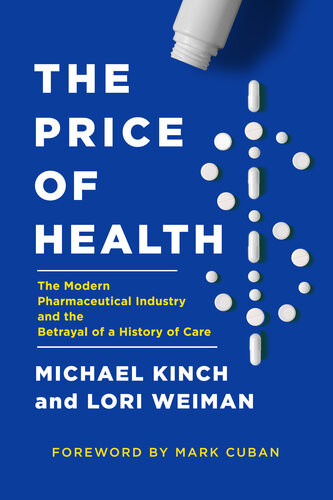Product desciption
The Price Of Health The Modern Pharmaceutical Enterprise And The Betrayal Of A History Of Care Michael Kinch Lori Weiman by Michael Kinch; Lori Weiman 9781643136813, 164313681X instant download after payment.
From "pharma bros" to everday household budgets, just how did the pharmaceutical industry betray its own history—and how can it return to its tradition of care?
It’s an unfortunate and life-threatening fact: one in five Americans has skipped vital prescriptions simply because of the cost. These choices are being made even though we have reached a point in the conveyance of medical options where cancers can be cured and sight restored for those blinded by rare genetic disorders. How, in this time of such advancements, did we reach a point, where people cannot afford the very things that could save their lives?
As the COVID-19 global pandemic has pointed out, we need the leadership of scientists, researchers, public health officials and lawmakers alike to guide us through not only in times of a global health crisis, but also during far more mundane times. For the first time in decades, people from all walks of life face the same need for medicine. It is time to discuss the tough questions about drug pricing in an open, honest and, hopefully, transparent manner.
But first we must understand how we, as a society, got here. Medicines are arguably the most highly regulated—and cost-inflated—products in the United States. The discovery, development, manufacturing and distribution of medicines is carried out by an ever more complex and crowded set of industries, each playing a part in a larger “pharmaceutical enterprise” seeking to maximize profits. But this was not always the case.
The Price of Health is the reveals the story of how the pharmaceutical enterprise took shape and led to the present crisis. The reputation of the pharmaceutical industry is suffering from self-inflicted wounds and its continued viability, indeed survival, is increasingly questioned. Yet the drug makers do not shoulder all the blame or responsibility for the current price crisis. Deeply researched, The Price of Health gives us hope as to how we can still right the ship, even amidst the roiling storm of a global pandemic.
How have medicines have been made and distributed to consumers throughout the years? What sea of changes that have contributed to rising costs? Some individuals, actions, and systems will be familiar, others may surprise. Yet the combined implications of these actions for will be surprising and at times shocking to both industry professionals and average Americans alike.
Like so much else in human history, the history of the pharmaceutical enterprise is populated mostly by well-intended and even noble individuals and organizations. Each contributed to the formation or maintenance of structures meant to improve the quality and quantity of life through the development and distribution of medicines. And yet systems originally created to do good have often been subverted in ways contrary to the motivations of their creators. Only by understanding this disconnect can we better tackle the underlying problems of the industry head on, preventing foreseeable, and thus avoidable, medical calamities to come.


